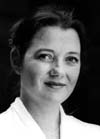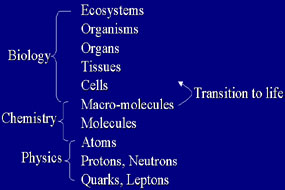A Hierarchy of SciencesI'm going to start from the assumption that science makes dualism and trichotomism very implausible and that Jews and Christians never needed those views in the first place. And I will set out to try to develop a non-reductive view of physicalism. Now, to do that, I'm going to start by thinking about the sciences. And, in particular, I want you to think about how the various physical sciences fit together. You may have mused about this when you were a college student or those of you who are college students may think about it sometimes. One way to think about it is this: We can make a hierarchy of the sciences. You go to physics class and you study the smallest particles making up the physical universe. You go from there to chemistry class and there you study how those smallest particles combine to make atoms and how atoms combine to make molecules. You go then to biology class and there you study how biological processes depend on the behavior of very large complex molecules just as we saw in Cynthia Fitch's lecture before the break. So we can think of the relations among the sciences and what they study something like this: Hierarchy of Complex Systems
Physics studies the smallest particles of matter, as we know them--I hope I've got them listed more or less right for present purposes. Chemistry studies those same particles in larger configurations. And notice that there is an overlap between the domain of chemistry and physics. Biology studies a variety of levels, beginning with the macromolecules that you saw in the lecture on genetics earlier. Now, notice that I've indicated in the hierarchy transition to life. And that's approximate. From that there are a lot of levels missing between the macromolecules at a cell, which is a very, very complex entity as compared with the molecules that make it up. Now, there was a huge controversy in biology and philosophy of biology as recently as the 1930s. The question was: Do you have to add some non-material entity to non-living matter in order to get a living being. For example, do you have to add some sort of vital force or to use an older term from Aristotelian biology, do you have to add an Entelechy. Or, to put it in terms of our debate about physicalism versus dualism, do you have to add a soul. Because one of the functions that was originally attributed to the soul in medieval thought was that it was the life force, it's what makes things alive. So the controversy raged. It was called the vitalist controversy but it's been pretty well settled by now. And I don't know if you could find a biologist these days who thinks that you do have to add some additional substance to non-living matter in order to get a living being. Rather, what's needed in order to get life is new structure. You restructure the materials that were already available into a more complex organization. Now, an aside here, I'm not arguing against divine creation when I'm talking about getting life out of matter. You can put it in purely scientific terms or you could put it this way: God did not have to add any non-material stuff to create life. He only had to organize the matter that was there.
|
|
Source: Dr. Nancey Murphy Presented at the 'Ethics, Values and Personhood in the 21st Century' Conference held in January 2000 at Seattle Pacific University See also:
|





